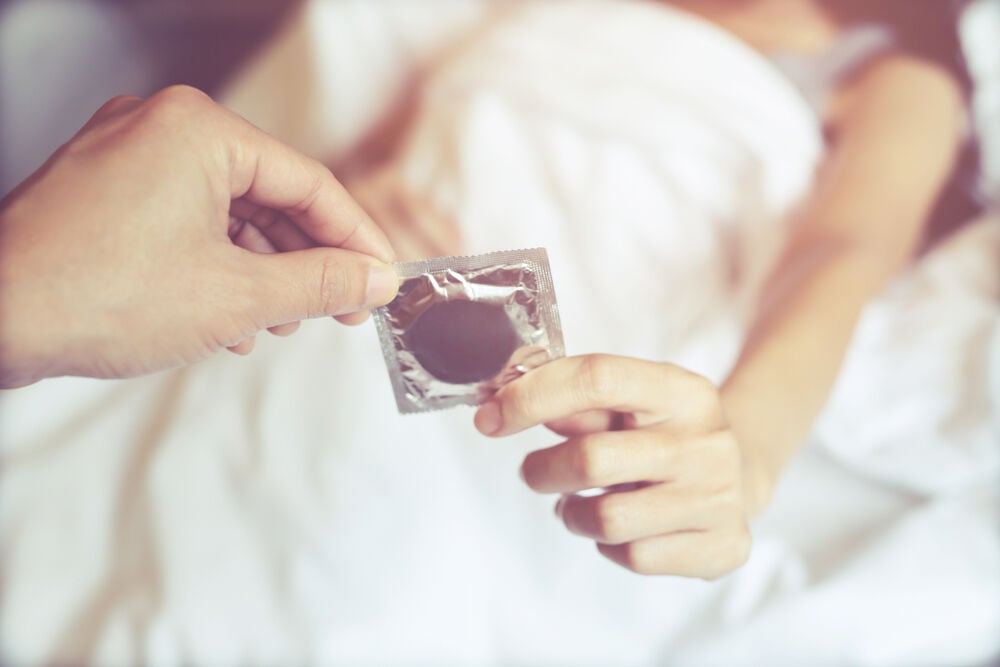Have you ever wondered, “Can you get pregnant the first time you have sex?” It’s a common question. Keep reading to get the answer, as well as recommendations to reduce your risk of unwanted pregnancy or sexually transmitted infections (STIs).
-
Tracking cycle
-
Getting pregnant
-
Pregnancy
-
Help Center
-
Flo for Partners
-
Anonymous Mode
-
Flo app reviews
-
Flo Premium New
-
Secret Chats New
-
Symptom Checker New
-
Your cycle
-
Health 360°
-
Getting pregnant
-
Pregnancy
-
Being a mom
-
LGBTQ+
-
Quizzes
-
Ovulation calculator
-
hCG calculator
-
Pregnancy test calculator
-
Menstrual cycle calculator
-
Period calculator
-
Implantation calculator
-
Pregnancy weeks to months calculator
-
Pregnancy due date calculator
-
IVF and FET due date calculator
-
Due date calculator by ultrasound
-
Medical Affairs
-
Science & Research
-
Pass It On Project New
-
Privacy Portal
-
Press Center
-
Flo Accuracy
-
Careers
-
Contact Us
Can You Get Pregnant the First Time You Have Sex?


Every piece of content at Flo Health adheres to the highest editorial standards for language, style, and medical accuracy. To learn what we do to deliver the best health and lifestyle insights to you, check out our content review principles.
Can you get pregnant the first time you have sex?
Many young adults understand the basic foundations of sex education, but misconceptions still abound. For example, a young woman may ask, “Can you get pregnant your first time having sex?” and hear misinformation about how being a virgin makes it impossible to get pregnant.
The straightforward answer is that, yes, a woman can get pregnant the first time she has sex. Anytime ovulation happens pregnancy can occur, and this includes the first time a person has sex.
Chances of getting an STD after first-time sex
Sexually transmitted diseases (STDs) or sexually transmitted infections (STIs) are a potential consequence of sexual intercourse. Most STIs are transmitted through contact with fluids, such as vaginal fluids, blood, or semen. Additionally, some STIs can be transmitted by contact with sores or infected skin. Individuals can be exposed to infected fluids or skin during oral, vaginal, and anal sex.
STIs don’t always present immediately. Sometimes they don’t have any noticeable symptoms, so individuals may not always be aware they’re infected.
Certain behaviors can increase the risk of contracting an STI, including:
- Multiple sexual partners
- Having a partner who’s had more than one sexual partner
- Sexual intercourse with someone who has an STI
- Use of intravenous drugs
- Unprotected sexual intercourse (oral, vaginal, and anal)
Many people become sexually active during adolescence. In the United States, the average age a woman loses her virginity is 17.4 years old. Being young is a risk factor for contracting an STI. Studies show that the earlier individuals engage in sexual intercourse, the higher their STI risk.
Infected partners and risk
Having a partner or partners with an STI significantly increases the risk of infection. When you have sexual intercourse or intimate contact with an individual who already has an STI, they can pass it on to you. Even if your partner is honest and tells you if they know they have an STI, not all STIs display symptoms, so they may be completely unaware they’re passing on an infection to you.
Take a quiz
Find out what you can do with our Health Assistant
Regular STI testing
One of the best ways to be safe from STIs is to participate in regular STI testing. It’s a good idea to get tested before every new partner. This test needs to happen before any intimate contact starts; otherwise, there’s a risk the infection can spread. Using condoms can reduce the likelihood of transmitting an STI from one partner to another.
Condoms
However, condoms are not guaranteed to protect against STIs. They can rip or come off, making it possible to transmit an infection. However, condoms can significantly lower the risk of STIs.
In addition, some STIs, such as human papillomavirus (HPV) or herpes simplex virus (HSV), can be passed through skin-to-skin contact from areas that a condom doesn’t cover. Dental dams or condoms cut lengthwise can be used to cover areas around the genitals and offer more protection.
Risks associated with oral sex
It’s not uncommon to worry about getting STIs from oral sex. Many STIs can pass between the genitals and the mouth or throat. Some examples include gonorrhea, HPV, HSV, chlamydia, and syphilis.
Individuals may choose to use dental dams or condoms during oral sex to lower the risk of infection. Flavored condoms can make the experience more enjoyable for some.
Tips for reducing the risk of STIs
There are many steps individuals can take to reduce the risk of transmitting an STI:
- Always have open communication with partners about their sexual history. You should feel comfortable asking how many sexual partners they’ve had in the past, how many they currently have, and if they’ve ever had an STI before. Similarly, you should be willing to share your information with them.
- Always use a condom when you have sexual intercourse. This applies to all types of sexual intercourse, including vaginal, oral, and anal. Note that lubricated condoms with spermicides are no more effective than regular condoms, and frequent usage of some spermicides can increase the risk of HIV. Regular condom use reduces the risk of infection from a partner. Lambskin condoms do not offer protection from STIs.
- Whenever possible, avoid risky sexual behavior. Being young is a risk factor for contracting an STI because young people are more likely to engage in risky behavior. One unsafe sexual practice is anything that breaks or tears the skin. Even the smallest cut can allow germs to pass from one person to another. Body fluids also can carry STIs. When you have unprotected sex with an infected person, you’re at a high risk of being infected yourself.
- Some vaccinations are available that can help prevent some types of HPV and hepatitis B. Discuss with your doctor if this is the right choice for you.
- Ask new partners to get tested with you and share your results with each other. Go for testing before you have sexual contact with each other.
Which form of birth control to choose for the first time you have sex

Partners should discuss contraception choices before initiating sex. Male condoms can be up to 98 percent effective if used correctly and used every time you have sex. While oral contraceptives can be effective for preventing pregnancy, young teenagers and young adults may not use them efficiently enough for proper pregnancy prevention and they don’t offer protection from STIs.
It’s highly recommended to use a condom every time you have sex to prevent unwanted pregnancy and to reduce the risk of STIs. Condoms have to be worn correctly to be effective.
Can you get pregnant without having sex?
Pregnancy occurs when a sperm fertilizes an egg. Sperm enters the body through the vagina, traveling through the cervix and womb to the uterine tubes. If the sperm gets in the uterine tubes, and an egg is present, pregnancy can occur. This process is known as conception.
However, an egg can be fertilized by sperm without sexual penetration. Some examples of how this can occur include:
- The male partner ejaculates near the vagina.
- The male partner’s erect penis makes contact with the female body near the vagina. A liquid called pre-ejaculate is produced before ejaculation. Pre-ejaculate (sometimes known as pre-cum) can contain sperm, and it’s impossible to control. Additionally, this liquid can be less noticeable than semen.
- If you or your partner have pre-ejaculate or semen on your fingers and touch the vagina.
While it’s unlikely to get pregnant from anal sex, there is some risk. If a couple has anal sex, sometimes the semen can flow down from the area of the rectum to the vulva.
These instances present a relatively low risk of getting pregnant. Sperm can only live for a short time outside the body, so that makes it less likely. However, if you’re looking to avoid pregnancy, it’s important to understand these risks.
Top things to remember
A woman can get pregnant the first time she has sex. Anytime a person is ovulating and sperm finds an entry point into the vagina, there is a possibility of pregnancy. Safe sexual practices, such as wearing condoms and minimizing the total number of sexual partners, can help lower the risk of pregnancy and STIs.


Hey, I'm Anique
I started using Flo app to track my period and ovulation because we wanted to have a baby.


The Flo app helped me learn about my body and spot ovulation signs during our conception journey.


I vividly
remember the day
that we switched
Flo into
Pregnancy Mode — it was
such a special
moment.
Real stories, real results
Learn how the Flo app became an amazing cheerleader for us on our conception journey.




